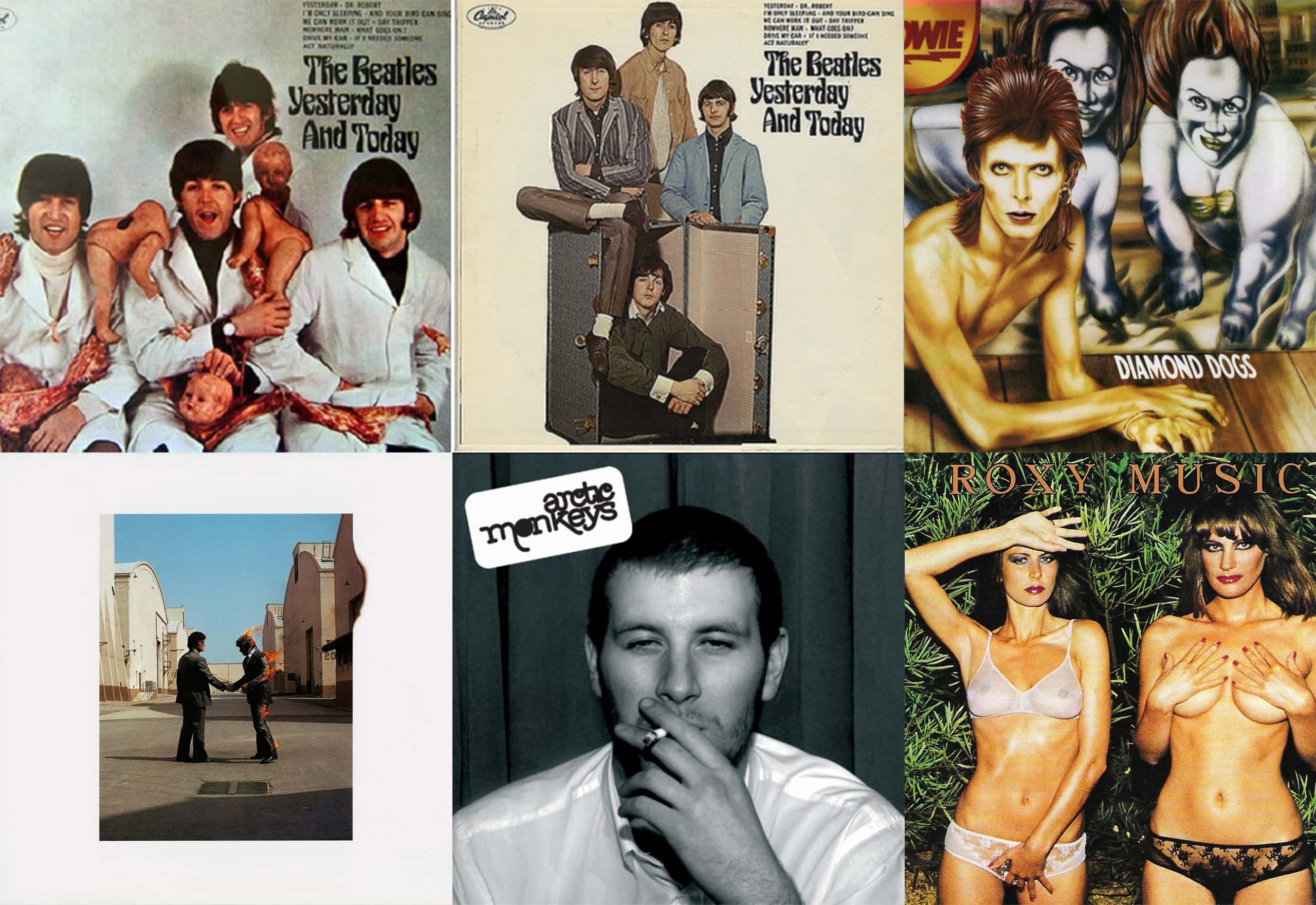
Following the news of Spencer Elden suing Nirvana for photographing him as a four-month-old baby for the band’s infamous Nevermind album, here are five British album covers with their own controversial histories.

David Bowie, Diamond Dogs

One of Bowie’s all-time favourite albums, this one really did take the term ‘the dog’s bollocks’ a step too far. Whilst the final album cover chosen was no less surreal, it turns out the original – produced by Belgian painter Guy Peellaert – had the addition of the half-dog, half-Ziggy Stardust’s penis on the full gatefold sleeve.
According to record-collecting publication Goldmine, the limited number of original, uncensored sleeves that did make their way into circulation are among some of the most expensive collectibles going, selling for thousands of dollars for a single copy. Undoubtedly, these are one of the crown jewels of collectors’ items – pun completely intended.
Arctic Monkeys, Whatever People Say I Am, That’s What I’m Not

The Arctic Monkey’s debut album, Whatever People Say I Am, That’s What I’m Not, is a staple of British culture, emblazoned in the minds of youngsters in no small part thanks to the popular Inbetweeners series (though it is of course a masterpiece in its own right). Yet much like the exploits of Will, Simon, Jay and Neil, some will deem the album cover, which shows close friend of the band Chris McClure smoking, to be a bad influence.
Such was the view of Dr Laurence Gruer, Director of Public Health Science for NHS Scotland when the album was released in 2006, who criticised the album’s main image, saying it “reinforces the idea that smoking is OK”.
The band’s defence? Johnny Bradshaw, album project manager, said: “You can see from the image smoking is not doing him the world of good.” That may be, but the album went on to become the fastest-selling debut album in UK chart history, selling 363,735 copies in the first week of release. Maybe that will have brightened McClure’s spirits.
Roxy Music, Country Life

Country Life, the fourth studio album from Bryan Ferry’s Roxy Music, became the centre of some controversy by showing two scantily-clad models: Constanze Karoli and Eveline Grunwald, who Ferry persuaded to do a shoot after meeting in Portugal. As a result, the image proved controversial and was censored in the US, Spain and the Netherlands.
In the US in particular, early releases were packaged in opaque shrink-wrap, whilst later releases produced between 1975 and 1980 only showed the trees behind Karoli and Grunwald. Author Michael Ochs has described this as ‘the most complete cover-up in rock history’ – ironically because of the models not covering up.
Thankfully for Karoli and Grunwald, whilst they weren’t credited originally for appearing on the cover, they were credited on the lyric sheet for their German translation work. Das ist großartig.
Pink Floyd, Wish You Were Here

For a track to be pure fire today generally denotes it’s one worth listening to. In 1975, when Pink Floyd released their ninth studio album Wish You Were Here, however, such a term was instead deemed ‘too violent’ by some retailers who consequently refused to sell the album, which presented the front cover of two men shaking hands with one of them on fire.
Whilst neither men seem fazed by the blaze, the retailers’ censorship led to a new design that included four elements on simple black nylon. Despite these changes, the album still spread like wildfire, having now been sold over 20 million times – at one stage EMI’s Harvest Records were unable to keep up with demand.
The Beatles, Yesterday and Today

When 60,000 copies of The Beatles’ Yesterday and Today were sent around to radio stations and distributors in the week before release, the negative reaction was immediate; disc jockeys were wholly outraged by the cover image; and most retailers found it so distasteful they refused to stock the LP.
Capitol Records immediately launched “Operation Retrieve”, recalling all copies of the LP from distributors to replace the offending image, as well as items such as promotional posters.
All copies were ordered back to the record label, which had the unexpected byproduct of rarity and popularity among collectors.
John Lennon defended the butcher sleeve for being “as relevant as Vietnam”, adding that “if the public can accept something as cruel as the war, they can accept this cover.” McCartney called their critics “soft”.
In 2007, George Martin, the producer of the album, recalled the cover had been the cause of his first strong disagreement with the band. He added: “I thought it was disgusting and in poor taste … It suggested that they were madmen. Which they were, but not in that way.”
Want to write for us? We’re looking for the best British arts and the people that make it, from Land’s End to John O’Groats. Have a look at our pitching guidelines.




